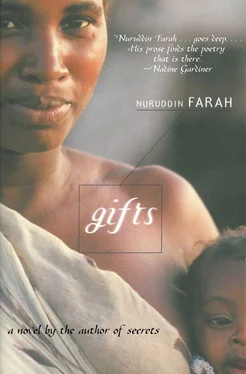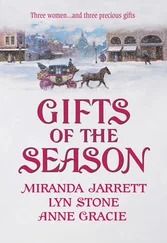Nuruddin Farah - Gifts
Здесь есть возможность читать онлайн «Nuruddin Farah - Gifts» весь текст электронной книги совершенно бесплатно (целиком полную версию без сокращений). В некоторых случаях можно слушать аудио, скачать через торрент в формате fb2 и присутствует краткое содержание. Год выпуска: 2011, Издательство: Arcade Publishing, Жанр: Современная проза, на английском языке. Описание произведения, (предисловие) а так же отзывы посетителей доступны на портале библиотеки ЛибКат.
- Название:Gifts
- Автор:
- Издательство:Arcade Publishing
- Жанр:
- Год:2011
- ISBN:нет данных
- Рейтинг книги:3 / 5. Голосов: 1
-
Избранное:Добавить в избранное
- Отзывы:
-
Ваша оценка:
- 60
- 1
- 2
- 3
- 4
- 5
Gifts: краткое содержание, описание и аннотация
Предлагаем к чтению аннотацию, описание, краткое содержание или предисловие (зависит от того, что написал сам автор книги «Gifts»). Если вы не нашли необходимую информацию о книге — напишите в комментариях, мы постараемся отыскать её.
Gifts — читать онлайн бесплатно полную книгу (весь текст) целиком
Ниже представлен текст книги, разбитый по страницам. Система сохранения места последней прочитанной страницы, позволяет с удобством читать онлайн бесплатно книгу «Gifts», без необходимости каждый раз заново искать на чём Вы остановились. Поставьте закладку, и сможете в любой момент перейти на страницу, на которой закончили чтение.
Интервал:
Закладка:
Once they had eaten, Mataan excused himself saying he had homework to do. He went to his room, pushing his door shut, and remained quiet, maybe working, maybe not. Yarey yawned and yawned, she was bored and tired. But Nasiiba and Bosaaso wanted to talk. It felt as though they intended to save the world with their chatter from its current crisis of civil wars, drought and intellectual bankruptcy.
Duniya got to her feet, ready to leave. Bosaaso, deferential, looked from Nasiiba to Duniya and back and didn’t know how to act. “You don’t have to go. Let her. She’s writing a letter to her brother Abshir,” Nasiiba said.
Neither Duniya nor Bosaaso could think of anything to say for a time.
“In that case I’ll come for you in the morning,” he offered.
“There’s no need,” she said.
He looked worried. “Aren’t you going to work?” Nasiiba asked.
“I’ve arranged an alternative form of transport for work,” she said, sounding mysterious.
He was desperate as he said, “Won’t you be taking your second driving lesson tomorrow afternoon?”
“Yes, but after Nasiiba and I have gone house-hunting.”
“How exciting, Mummy to be looking for somewhere to live.”
“Can I come with you, Duniya?” said Yarey.
“Good night then,” Duniya said to Bosaaso.
“Good night.”
And to Yarey, “Come, my dearest. Come with me if you’re bored.”
Left alone, Nasiiba and Bosaaso talked and talked, whereas Yarey. fell asleep the instant her head touched the pillow. Duniya read for a while and then wrote a letter to Abshir, her brother.
My darling brother:
I write to you with a sense of urgency and because Dr Mire has told me that you are planning to pay me and my children a long-awaited visit. I can’t tell you how delighted I am to receive you, to welcome you with a pent-up love which has been treasured for you for years.
As I pen this I can overhear Nasiiba and Bosaaso’s conversation about mythical and religious tensions present in the notion of “return,” and I think of you and how much I’ve missed you, and how much I long for the day when we’ll be reunited, to share our happiness and our pains.
You will find me a changed woman. A letter such as this cannot tell you much. But I look forward to telling you everything myself. Please please please telegraph me care of the hospital where I can be reached, giving me the details of your departure from Rome and arrival here so we can come to meet you at the airport.
I’ve been made to promise to ask you to bring special gifts for your nieces and nephew. Attached please find a list drawn up by Nasiiba — but then again you may disregard them.
Your loving sister,
Dunya
Restless, Duniya could not sleep. Nasiiba and Bosaaso were still talking several hours later. Whereupon Duniya shouted to Nasiiba to take from her Abshir’s letter and give it to Bosaaso, who knew someone leaving for Rome the following afternoon. Bosaaso saw this as an indication that it was time he left, which he did.
The night echoed with his and Nasiiba’s good-night wishes.
14
Duniya is given a lift to work by Mataan on a borrowed motor scooter Later that day, before her driving lesson, Duniya goes house-hunting and in the process calls on Miski, Fariida’s sister.
A woman in her mid-thirties is watching a sunset in a dream setting. A younger woman, presumably her daughter, materializes from nowhere and blocks her view The older woman turns the other way as though uninterested, her gaze this time dwelling on several stray evening clouds migrating towards darkness.
Mataan had a beautiful mouth which was often open. His silences stretched long, like an unending road, straight, unbending, not at all desolate. He had a way of surrounding himself with wise silences and his eyes would have a remarkable vacuity behind them. One was tempted to comment on these when alone with him. Shy, quiet, tall and skinny, with his mouth ajar like a door pushed open by the breeze, Mataan might concentrate on a wart on one’s face, waiting, saying nothing, forever patient. More than his one-liners, it was his silences one remembered.
His twin sister’s silent pauses had in them blind curves and on encountering them one had to be on guard for fear of being ambushed. Thus would Duniya try to explain her different attitudes towards her children’s quiet moments.
Mataan now said, “I’ve borrowed a motor scooter, Mother, and can give you a lift to work. My classes today don’t start till after ten-thirty.”
She had heard him leave the house at the crack of dawn, maybe to collect the scooter from its owner. Most probably he had decided to borrow it after having overheard her conversation with Bosaaso the previous night, in which she had talked of arranging an alternative way of getting to work.
“Whose is the motor scooter, Mataan?” she asked.
“It belongs to the cousin of a friend, Mother,” he said.
It didn’t require much for her to conclude that the Vespa belonged to Waris’s cousin — Waris, Mataan’s woman-friend. And though he was standing out of Duniya’s vision now, she knew he was swallowing lumps of nerves. Nasiiba and Yarey had been gone for a quarter of an hour showering together, and in the intervening period Mataan had come to make his offer of a lift, knowing that his twin would be averse to his gestures. “Come closer so I can see you,” Duniya suggested, and when he did, she said, “I don’t wish to interfere in your private affairs, but do you think it’s wise of me to turn down Bosaaso’s offer only for you to borrow a motor scooter from someone else to take me to work?” In the mean-time she wrapped herself in a bedspread.
He said humbly, “I don’t know,” meeting her eyes for the first time.
“Whose is it really?”
“The scooter is owned by an older man who likes to borrow my bicycle, so he can keep fit. I seldom make the exchange, Mother.”
“I wish you wouldn’t borrow things for my sake,” Duniya said.
He looked away. After a while he turned and her eyes fell on his young face, and a thought crossed her mind, one she couldn’t explain: that Mataan looked like a son. Whereas Nasiiba put her in mind of a young woman likely to become a mother one day, Mataan had the look of a sturdy young tree, firm and steadfast as somebody’s young son. To be labelled “Mataan: a son!” like a clothes dummy of a tailor’s with a price tag on it. Duniya reasoned that he would surely eventually marry a woman older than him.
“How much does a new-motor-scooter cost?” she asked.
“You can’t get them because of foreign currency restrictions.”
“How much would a good second-hand one fetch?”
He was silent, then said, “Let’s first find a home to move to.”
Nasiiba and Yarey had come on the scene, so Duniya and Mataan adapted themselves to the new arrivals. Yarey was in a chatty mood. She said, “You must go to see an Italian film called The Tree of the Wooden Clogs. Nasiiba and I saw it yesterday and we loved it, didn’t we, Naasi?”
Duniya guessed that Yarey’s lines had been given her by Nasiiba and had been rehearsed to the last comma, question and exclamation mark. Mataan, too, suspected this to be the case.
Yarey went on, “And you must see the big house Bosaaso lives in all by himself, Duniya, a big garden, a very large kitchen, larger than this place we live in, the four of us.”
Mataan left in haste, and this disturbed Nasiiba. “What was he talking about, Mummy?” she asked.
To avert early morning confrontation between the twins, Duniya suggested that Nasiiba hurry, for it was impolite to make the taxi wait longer than absolutely necessary.
Читать дальшеИнтервал:
Закладка:
Похожие книги на «Gifts»
Представляем Вашему вниманию похожие книги на «Gifts» списком для выбора. Мы отобрали схожую по названию и смыслу литературу в надежде предоставить читателям больше вариантов отыскать новые, интересные, ещё непрочитанные произведения.
Обсуждение, отзывы о книге «Gifts» и просто собственные мнения читателей. Оставьте ваши комментарии, напишите, что Вы думаете о произведении, его смысле или главных героях. Укажите что конкретно понравилось, а что нет, и почему Вы так считаете.











